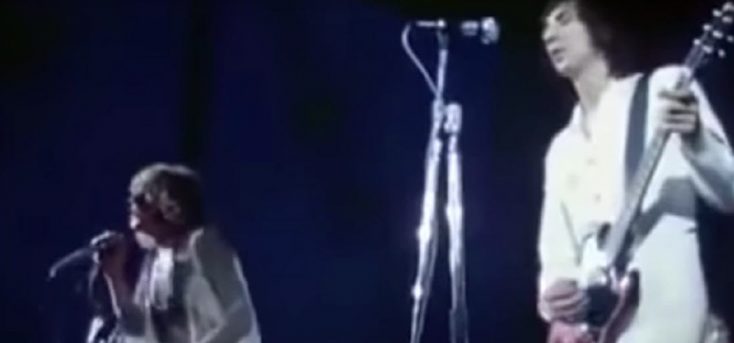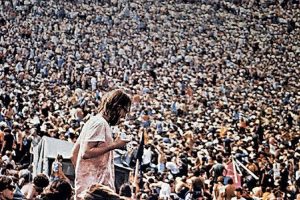Front Row Features
HOLLYWOOD-In part one of my article on “Woodstock,” the 1969 concert that defined the beliefs and ideals of a youthful generation, I spoke with director Michael Wadleigh and John Morris, who oversaw the festival. Part-two spotlights the men who helped create the movie that went on to win the Academy Award for Best Documentary in 1971. The interviews with the film’s Associate Producer, Dale Bell, its Sound Editor, Larry Johnson, and cameraman David Myers took place in 1995.
Q: Larry, I read that you were going to the festival as an audience member. Is that true?
Larry Johnson: I had heard about it and got a ticket and told Michael Wadleigh about it. He said, ‘Why don’t we just shoot this thing.’ We put the word out that we wanted to do it.
Dale Bell: We met with John Morris for the first time [the Saturday before the Festival.] The Woodstock Festival guys were very apprehensive about us, as well they should be. Who the hell were we? But in the end, they felt they’d better let somebody film it because it was all going to go down the drain.
David Myers: We went on spec a week early. The idea was if they could get funding or sell it, we’d get paid. Otherwise, we’d have an interesting weekend!
Q: David, where did the crew sleep during the festival?
David Myers: Most of the crew slept under the big truck-trailer that had our equipment. There wasn’t any extra room there, and Jimi Hendrix’s trailer was close by, and I slept under it. I got to hear interesting sound effects at three or four in the morning.
Q: What do you remember about the big storm that hit on Sunday?
Dale, I hear you cut the electricity, but the cameramen kept filming with their batteries.
Dale Bell: Not to film that stuff would have been sacrilegious. They had to do it. Even if somebody got electrocuted, you’re there to get the shot.
Larry Johnson: When the rain came, we started to get voltage spikes through the lines. All the cameramen would get these shocks out of nowhere into the [camera’s] motor. Looking at the film dailies later, all of a sudden you’d see the cameras jerk at the same time, because it meant the cameramen were getting this voltage spike from down the line.
David Myers: For my friends on stage, I think it was very risky. They could have been electrocuted. I shot very little on stage. I was [shooting] all over the 10 mile area.
Q: David, two of the segments you filmed ended up in lawsuits. One concerned a man who cleaned the portable toilets.
David Myers: The Port-O-San man was really an interesting fellow. It turned out that he had a son in Vietnam and a son there at Woodstock. His wife had gotten a lawyer, and they said I was making fun of him. What it really was, was that they lived in a lower middle-class housing track in New Jersey, where they were trying to be very upscale, and the wife had told the neighbors that he was a sanitary engineer. That was a little blown by the interview. (The case was thrown out of court)
Q: Tell us about the second case which concerned a couple you followed?
David Myers: It was the third day and there had just been the big storm. The sun had come out and I saw a [naked] couple go by. They split off from the crowd and walked into the field. There, amongst the flowers, they lay down and did their number; legs and arms coming up and down. At the end, they got up and they walked off, completing the sequence.
I got a call from about five lawyers who took my deposition about it. I said, ‘Why is he suing?’ And they said, ‘He’s a hairdresser in Montreal, and it’s ruining his business. It’s getting around that’s he’s straight, and he’s supposed to be gay!” (That case was also thrown out of court.)
I have to say, I’m rather proud that I was responsible for what, I believe, were the two major trials related to “Woodstock.”
Q: When the festival was over was it difficult to sync up all the footage?
Dale Bell: There was no common sync-pulse. We had tried to do it with a digital clock, but they were scarcely known at the time, and I couldn’t get the clock working. Eventually in editing, in the synching up of the material, we did it by flashbulbs that went off in the audience. So if we had a pattern of two flashbulbs, and you knew that camera B had shot the same song as camera A, you looked for that pattern of the flashbulbs and eyeball-sunk it. There was 175 hours to sync up.
Q: Larry, you worked with two giants of the industry, the Head of Sound at Waner Brothers, George Groves, who had mixed “The Jazz Singer,” and Gordon Davies who had done sound on “Rebel Without a Cause.” What was that like?
Larry Johnson: They were the old guard, and I was coming in with things that they weren’t aware of, multi-tracked technology. They were very accepting of us. I think they respected our sense of technology and knew that we were advancing the art to another level. I think that was the last movie George and Gordon did.
Q: You were up for the Academy Award for Best Sound for “Woodstock,” but lost to “Patton.”
Larry Johnson: I was disappointed that I didn’t win. I knew we had done an incredible job. We had to create this multi-tracked epic that had never been done before.
Q: While you were filming the festival, did you feel you were part of history?
Larry Johnson: We had a clue. We wouldn’t have gone with 60 people unless we all had a clue that this was a big cultural moment.
David Myers: I definitely had that feeling.
Dale Bell: Yeah, it didn’t take long. I knew damn well this was going to be a big deal. Being on stage with Joanie Baez. She was singing a cappella and to hear a single a cappella voice among half a million people was quite extraordinary.
Q: What are your final thoughts as you look back on the movie?
Dale Bell: This was an opportunity for those of us who had protested the war to come together. It just turned out to be something far bigger than anybody ever could envision, either in their mind or in their spirit.
David Myers: It wasn’t just the music; it was a feeling of community. The drug scene there was not gross at all. People were like innocents who overdosed because they didn’t know any better. When I saw “Woodstock,” it brought tears to my eyes. It was a film about both innocence and hopefulness.
Larry Johnson: I’m more sad about the effect of it now, more than what happened then. The fact that the hope that existed at that point never went beyond it. I think how it is now, and how it could have been.
Note: Unfortunately, David Myers passed on at the age of 90 in 2004 and Larry Johnson died in 2010 at the young age of 62.
Portions of this article were first published in Film Review Magazine






